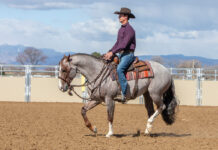 1. Do attend shows that offer classes appropriate for your level of expertise. Look for shows where you’ll compete against your peers. That way you’ll come home with a realistic evaluation of where you and your horse shine and what you need to work on at home.
1. Do attend shows that offer classes appropriate for your level of expertise. Look for shows where you’ll compete against your peers. That way you’ll come home with a realistic evaluation of where you and your horse shine and what you need to work on at home.
3. Do understand the requirements and judging criteria for each class before you enter. Being well informed will prevent some potentially embarrassing moments, such as being asked to execute a test you’ve never perfected at home.
4. Do pay attention to the finer points of your appearance and your horse’s turnout. The judge isn’t impressed by designer apparel or high dollar tack. But the judge will definitely notice distractions like dusty boots, messy hair-dos and skinny horses goobered with sweat stains.
5. Do keep an eye out for traffic jams and trouble spots in every class. There always seems to be at least one horse that’s a trouble maker: Either it kicks, blows up in the corners or breaks its gait. Find that horse during your first lap around the arena. And then stay away from it.
6. Don’t use illegal or non-traditional tack. If you think you had a flawless performance, yet you ended up ribbonless, inspect your gadgets. The wrong noseband, for example, can eliminate you from competition in a hunter class. A curb bit with the wrong shank can boot you from the ribbons in western pleasure. Know the rules beforehand and dress your horse appropriately.
7. Don’t let your unruly monster disrupt the day. While green horses are expected to have their baby moments at shows, it’s not fair to ruin someone else’s chance at a ribbon while you attempt to school your youngster. If your greenie suffers a total meltdown at a show, take him home—or at least back to the trailer for a time out.
8. Don’t be the one who holds up the class. Learn to manage your time at horse shows so you don’t end up making the judge and your fellow competitors wait while you shimmy into your chaps or snap on your helmet.
9. Don’t blame the judge if you go home without a ribbon. It’s always easy to claim the judge was prejudiced against you or your horse rather than to accept that you were simply out-ridden by the other competitors. Remember that in each class your performance is being compared to that of every other entrant or against the ideal standard. Objectively examine the riders that consistently win, and try your best to emulate them.
10. Don’t give up showing after a bad day. Sure, it can be demoralizing if you go home without a ribbon. Showing requires investments of time, emotion and money. But try to think of a poor day showing as a learning experience. Maybe you need more riding lessons, or your horse requires a tune-up from a professional trainer. Or perhaps you were showing just a little out of your league, and you’d do better at a smaller, local show. There’s a horse show nearly every weekend. Find one where you and your horse fit, be properly prepared at home, and rally your spirit to face another blue ribbon challenge.
Further Reading
Show Survival Tips






Thanks for the good advice. I learned a couple things that I plan to use at my next horse show!
Thanks yjis helped me alot and i learned alot i will be taking this sheet with me everywere!